Positive Neuroplasticity Books
Dr. Rick Hanson’s books cover the fundamentals of Positive Neuroplasticity, how we can overcome the brain’s negativity bias, build reslience by cultivating key inner strengths, and develop a buddha brain of peace, contentment, and well-being.
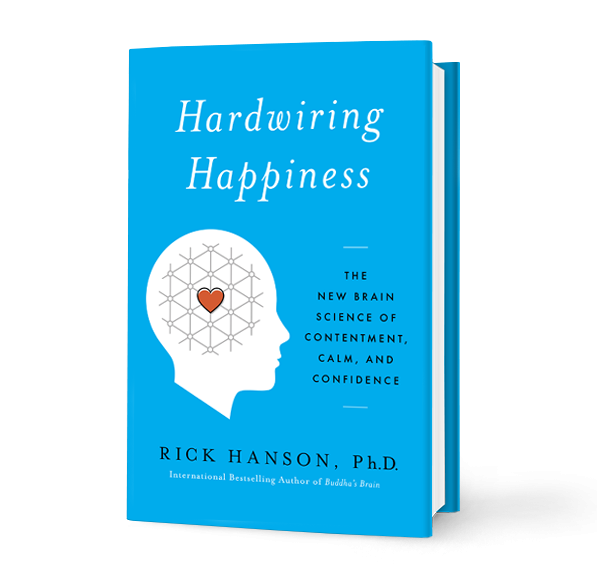
Beat the brain’s negativity bias with four steps using positive neuroplasticity for lasting contentment, calm, and confidence.
LEARN MORE
Your brain has a negativity bias that makes it like Velcro for negative experiences and Teflon for positive ones. This bias evolved to help ancient animals survive, but today it makes us feel needlessly frazzled, worried, irritated, lonely, inadequate, and blue.
The good news is that in just a few seconds at a time in the flow of daily life, you can turn your experiences – the pleasure in a cup of coffee, the accomplishment in finishing a tricky email, the warmth from a friend’s smile – into lasting inner strengths built into your brain, such as resilience, balance, and positive emotions.
Grounded in neuroscience, this book from New York Times bestselling author Rick Hanson, Ph.D. is super practical, full of easy-to-use methods and guided practices to grow a steady well-being, self-worth, and inner peace. And it has special sections on children, motivation, relationships, trauma, and spiritual practice.
Learn how to manage your Stone Age brain in the 21st century – taking in experiences of your core needs being met, so that you gradually leave the “red zone” of fight-flight-freeze stress and get centered in the brain’s “green zone” in which you feel an ongoing sense of ease, fulfillment, and love – even while you deal with life’s challenges.
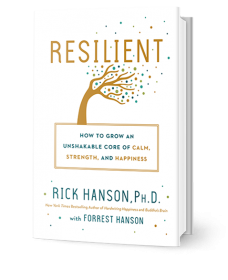
Develop twelve key inner strengths for lasting well-being in a changing world.
LEARN MORE
These days it’s hard to count on the world outside us. So it’s vital to grow strengths inside like self-worth, patience, kindness, and joy. These make you resilient: the foundation of lasting well-being in a changing world.
With his trademark blend of neuroscience, mindfulness, and practical psychology, New York Times bestselling author Dr. Rick Hanson (with Forrest Hanson) shows you how to deal with stress and pursue your dreams with a deep sense of capability and contentment.
Based on the successful Foundations of Well-Being program, as well as 30 years of clinical practice and teaching, this practical guide to reliable happiness is full of concrete suggestions, experiential practices, personal examples, and insights into the brain. It also includes many ways to handle conflicts with others and have more satisfying relationships.
Warm, encouraging, and down-to-earth, Dr. Hanson’s step-by-step approach is grounded in the science of positive neuroplasticity. He shows you how to overcome the brain’s negativity bias, release painful thoughts and feelings, and replace them with self-compassion, hope, and inner peace.
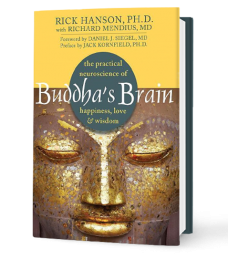
Change your brain and your life with the practical neuroscience of happiness, love, and wisdom.
LEARN MORE
Jesus, Moses, the Buddha, and other great teachers were all born with a brain built essentially like anyone else’s. Then they used their minds to change their brains in ways that changed history.
With the new breakthroughs in neuroscience, combined with insights from thousands of years of contemplative practice, you, too, can shape your own brain for greater happiness, love, and wisdom.
Written with neurologist Richard Mendius, M.D., and with a Foreword by Daniel Siegel, M.D. and a Preface by Jack Kornfield, Ph.D., Buddha’s Brain: The Practical Neuroscience of Happiness, Love, and Wisdom joins modern science with ancient teachings to show you how to have greater emotional balance in turbulent times, as well as healthier relationships, more effective actions, and greater peace of mind.
Well-referenced and grounded in science, the book is full of practical tools and skills that you can use in daily life to rewire your brain over time. The brain is the bodily organ that most affects who you are and your experience of living – so learning how to take good care of it, and strengthen and direct it in the ways that will help you the most, is a profound gift to yourself, and to everyone else whose life you touch.
You’ll learn how your brain creates worry or inner strength, heartache or love, anger or peacefulness, confusion or clarity, and suffering or its end – and how to:
- Take in good experiences to feel happier and more confident – defeating the brain’s negativity bias, which is like Velcro for bad experiences but Teflon for positive ones
- Train your brain to cool down stress, greed, and hatred – and come home to your natural core of calm and contentment
- Energize the neural networks of compassion, empathy, and love – and clear out resentment, envy, and ill will
- Improve attention for daily life, mindfulness, and meditation
- Feel more at one with the world, and less separate and vulnerable
- Get the nutrients your brain needs to maintain a good mood, relieve anxiety, sharpen memory, and strengthen concentration. If you can change your brain, you can change your life.
That’s the promise of Buddha’s Brain: The Practical Neuroscience of Happiness, Love, and Wisdom.
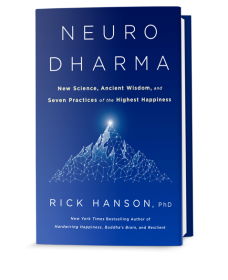
Experience the heights of human potential with seven practices grounded in new science and ancient teachings.
LEARN MORE
Throughout history, people have sought the heights of human potential—to become as wise, strong, happy, and loving as any person can ever be. And now recent science is revealing how these remarkable ways of being are based on equally remarkable changes in our own nervous system, making them more attainable than ever before.
In Neurodharma, New York Times bestselling author Dr. Rick Hanson explores the new neuroscience of awakening and offers a bold yet plausible plan for reverse-engineering peak experiences, sense of oneness, and even enlightenment itself. And he does so with his trademark blend of solid science and warm encouragement, guiding you along this high-reaching path with good humor, accessible tools, and personal examples.
The breakthroughs of the great teachers are not reserved for the chosen few. Neurodharma shares seven practices for embodying them ourselves in daily life to handle stress, heal old pain, feel at ease with others, and rest in the sense of our natural goodness. By strengthening the neural circuitry of profound contentment and inner peace, you’ll cultivate unshakable presence of mind, a courageous heart, and serenity in a changing world.
With deep research, stories, guided meditations, examples, and applications, Dr. Hanson offers a fascinating, inspiring vision of who we can be – and an effective path for fulfilling this wonderful possibility.
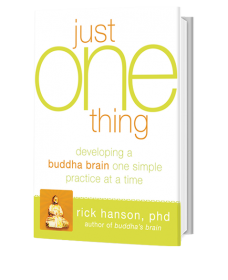
52 short practices for peace of mind, inner strength, and lasting contentment.
LEARN MORE
Each day we are pushed around by external forces – from the economy to the people we live and work with – and by reactions to these that come from ancient reptile/mammal/primate/caveman circuits inside our own brains. But now, with the power of modern neuroscience, we can take charge of the brain and gradually change it for the better.
That’s the promise of Just One Thing: Developing a Buddha Brain One Simple Practice at a Time – which shows you down-to-earth ways to build up a “buddha brain” for more peace of mind in stressful times, greater inner strength and confidence, and an unshakeable sense of contentment and worth.
Just One Thing has been praised by leading scholars, psychologists, and meditation teachers – including Jack Kornfield, Ph.D., Tara Brach, Ph.D., Daniel J. Siegel, M.D., Kristin Neff, Ph.D., Ronald D. Siegel, Psy.D., Sharon Salzberg, Christopher K. Germer, Ph.D., Daniel Ellenberg, Ph.D., Elisha Goldstein, Ph.D., and Wes Nisker – and you can read their endorsements.
The original meaning of the word “buddha” is one who knows how to be truly happy and effective. Developing a buddha brain is for anyone – Christian, Jewish, atheist, etc. – who wants this kind of brain.
The book presents 52 practices – simple actions inside your mind – that light up neural networks of deep well-being and resilience. And because “neurons that fire together, wire together,” each time you do a practice, it strengthens key neural circuits like building a muscle in the gym.
Each practice is grounded in modern neuroscience, positive psychology, Rick’s background in the very real world of business and raising a family. Each bite-size chapter introduces a new practice, explains why it’s important, and shows you how to do it.
We are so busy these days that it’s great to have just one thing to focus on to make your life better. Practice is not some flabby, airy-fairy mumbo-jumbo – it takes grit and honest work – you earn the results, and can respect yourself for them.
Broken up into five user-friendly sections, this pocket-sized “owner’s manual plus toolbox” helps you transform your brain from the inside out. The practices offered take at most a few minutes a day – and can be done anytime, anywhere. They include:
• Get on Your Own Side
• See the Good in Yourself
• Feed Your Brain
• Fill the Hole in Your Heart
• Risk the Dreaded Experience
• Accept the Limits of Your Influence
• Don’t Throw Darts
• Notice You’re Alright Right Now
• and so much more!
Bottom line, it’s the law of little things. A small thing repeated each day adds up over time to produce big results; a small thing that is in your power to do – in a world in which so many things are not. Just one small thing that could change your life!
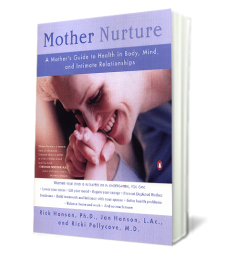
A mother’s guide to health in body, mind, and intimate relationships.
LEARN MORE
Mothers today juggle more tasks, work longer hours, and sleep less than their own mothers did. Yet the self-healing revolution has overlooked the most significant issue in the lives of some twenty million women: how to cope with the relentless, sometimes overwhelming, stresses of raising young children in the twenty-first century.
Only Mother Nurture:
- considers the long-term well-being and health of mothers
- explains how women can become physically depleted as a result of the demands and stresses of raising a family today
- identifies the Depleted Mother Syndrome many women experience
- presents a comprehensive, integrated program of care for a mother’s body, mind, and intimate relationships
- tells in detail how a mom and dad can work together and share the load fairly
- integrates the perspectives of a psychologist, acupuncturist/nutritionist, and obstetrician/gynecologist.
This is more than another self-help book. With compelling evidence (see references below), clear logic, and heartfelt personal testimony, it is a manifesto for an idea whose time has come: that our society absolutely must take better care of its mothers – and by doing so, take better care of its fathers, children, and families.
Other Notable Books on Brain Science
The Accidental Mind – David Linden
Bouncing Back – Linda Graham
The Brain that Changes Itself – Norman Doidge
Destructive Emotions – Daniel Goleman
Emotional Intelligence – Daniel Goleman
The Feeling of What Happens – Antonio Damasio
In Search of Memory – Eric Kandel
The Man Who Mistook His Wife for a Hat – Oliver Sacks
Mind Wide Open – Steven Johnson
The Mindful Brain – Daniel Siegel
Rhythms of the Brain – György Buzsáki
The Seven Sins of Memory – Daniel Schacter
Synaptic Self – Joseph LeDoux
Train Your Mind, Change Your Brain – Sharon Begley
Why Zebras Don’t Get Ulcers – Robert Sapolsky
